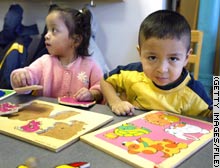Minorities getting closer to the majority for a bigger and more intrusive government

They're cute, but if their parents are illegal aliens, are these children really American citizens, and should they be?
Hispanics are fastest-growing group, increasingly U.S.-born
A CNN Report:
The influence of traditional minorities in the United States will continue to grow, new Census Bureau statistics suggest, with Hispanics born a Americans citizens accounting for more than a third of the population increase last year.
Bureau figures released Wednesday show the U.S. population grew by 2.8 million between July 1, 2004, and July 1, 2005. Hispanics accounted for 1.3 million of that increase, with 800,000 attributable to natural causes -- births minus deaths -- rather than immigration.
Coupled with the high birth rate for Hispanics -- the Population Resource Center cites statistics showing the average Hispanic woman will have three children in her lifetime; it's 1.8 for non-Hispanic whites -- the number means Hispanics will make up an increasing share of the citizenry.
"It mutes the illegal-versus-legal debate," said Linda Jacobson, director of domestic programs for the Population Reference Bureau in Washington. "We need to be more focused on how we meet the needs of children in immigrant families who are citizens."
Census statistics also show that 45 percent of children under age 5 are from a racial or ethnic minority.
About a third of Hispanics were younger than 18, compared with a fourth of the population in general, the bureau said.
The median age for Hispanics -- the point at which half are older and half are younger -- was 27.2 years in 2005. It was 30.0 years for blacks and 40.3 years for white non-Hispanics.
For Census measurements, Hispanics can be of any race. The following numbers include people who reported a race alone or in combination with one or more other races.
The overall U.S. population totaled 296.4 million in 2005; 33 percent of that number, or 98 million, were minorities.
Hispanics remained the largest minority group at 42.7 million. They were the fastest growing group from 2004 to 2005, with a 3.3 percent increase.
Blacks represented the second largest minority group, with 39.7 million people and a 1.3 percent increase from 2004 to 2005.
They were followed by Asians (14.4 million; 3 percent increase); American Indians and Alaska natives (4.5 million; 1 percent increase); and native Hawaiians and other Pacific islanders (990,000; 1.5 percent increase).
The number of non-Hispanic whites indicating no other race in 2005 totaled 198.4 million, an increase of 0.3 percent.
Growing Clout
Because there is only one death for every 8.2 Hispanic births in the U.S., according to Census estimates, the U.S.-born Hispanic population can only be expected to grow.
With growth will come increased economic and political clout.
"Already, Hispanics are an economic force, and because they are growing in number, that won't change," said Jacobson, who added that corporate America is taking notice.
Libbey Paul, a senior vice president of marketing for ACNielson, the marketing information company, told The Associated Press that supermarkets are looking to stock more of what large, young families need, items like toothpaste, and food companies are producing more products that cater to Hispanic tastes.
"They've become more politically and socially visible," she told AP. "It's never been this vocal."
President Bush and Congress have been debating changes to the nation's immigration laws in recent months, spawning a series of high-profile demonstrations across the country by protesters sympathetic to illegal immigrants.
Mark Sawyer, an assistant professor of political science at UCLA, said the growing Hispanic population nationwide could tip the political balance in some states.
Potentially alienating Hispanic voters, he said, "is of concern to the Republican Party."
Hispanic voters, he said, tend to "believe in a kind of social safety net."
"They're concerned about education and health care and believe the government should play a role in it," Sawyer said. "That potentially means that many red states may turn blue, particularly those that still have a large African-American population."
Bingo! Of course the political parties will like these voters. Whereas most traditional Americans want less government and fewer taxes, this new and growing group of voters apparently means bigger government that interferes more in the lives of the citizenry, one that perpetuates and gives reason for the existence for Congress and the burgeoning bureaucracies and governmental agencies.
Does this really "mute the illegal vs. legal question?" There are some that believe that the Fourteenth Amendment doesn't create citizens from the children of illegal aliens who "are not under the jurisdiction of the United States" because they are not citizens.
This isn't rocket science: the proposed "legalization" demanded by immigrants and aliens would clear that up: parents would become citizens and their children's status would then be assured. The amendment is clear, but not being enforced...so, what else is new!


0 Comments:
Post a Comment
<< Home